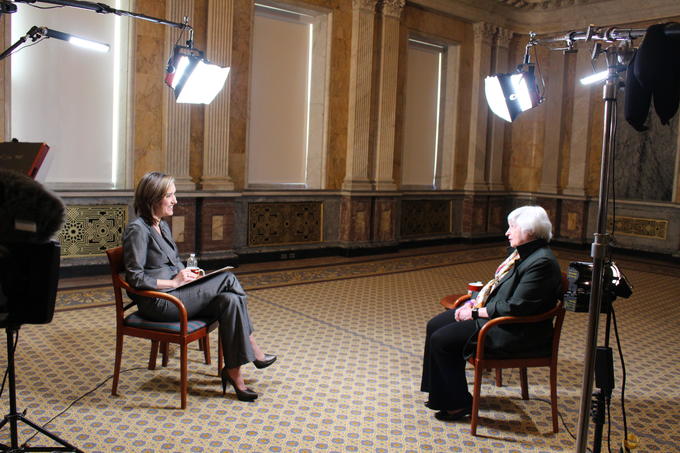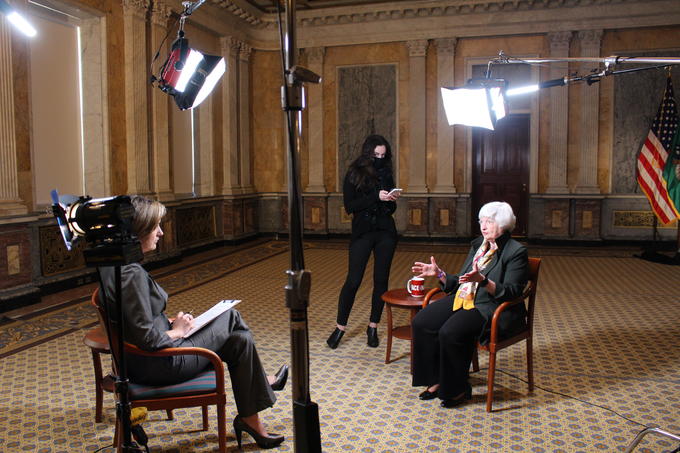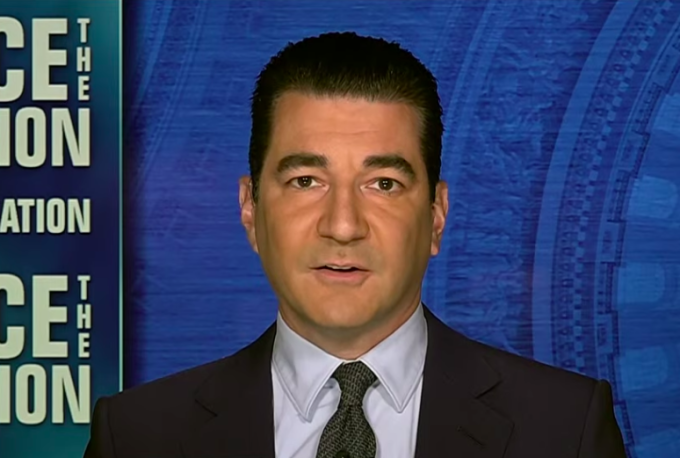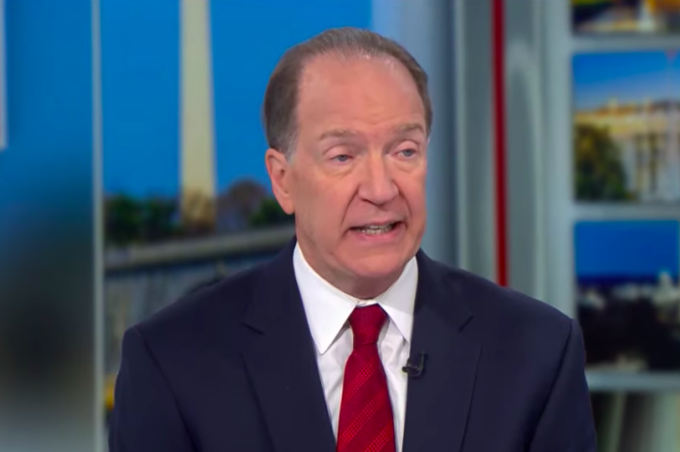| "Labor supply is abnormally low, I believe, because of the pandemic." - Treasury Secretary Janet Yellen on the ongoing impacts of the coronavirus pandemic.
Welcome to the "Face the Nation" Five at Five newsletter. Scroll down for your five takeaways from today's broadcast of "Face the Nation with Margaret Brennan" on CBS. Did someone forward you this? Sign-up at cbsnews.com/email. 1. Yellen: Economic slowdown in China would have "global consequences"  The Biden administration is closely watching the situation unfolding in China with the world's most indebted property developer, according to Treasury Secretary Janet Yellen , who warned in an exclusive interview with "Face the Nation" moderator Margaret Brennan that China's struggles to pay back billions in loans could have repercussions for the global economy. What Yellen said: "Real estate is an important sector of the Chinese economy. It accounts for about 30% of demand. And a slowdown in China, of course, would have global consequences. China's economy is large, and if China's economy were to slow down more than expected, it certainly could have consequences for many countries that are linked to China through trade." Why it matters: The Federal Reserve warned of direct risks to the U.S. in its latest financial stability report. "Financial stresses in China could strain global financial markets through a deterioration of risk sentiment, pose risks to global economic growth, and affect the United States," the report read. Economists say Beijing can prevent a Chinese credit crunch but that it wants to avoid appearing to arrange a bailout while it tries to force other companies to reduce reliance on debt. For now, the Chinese government has remained silent about whether it might intervene to restructure Evergrande's debt. 2. Yellen: Labor force participation "quite depressed" compared to pre-pandemic levels  The uneven job recovery -- namely a shortage of workers -- is a direct result of the pandemic, Treasury Secretary Janet Yellen told "Face the Nation" in that same interview. "When we really get control of the pandemic, I think labor supply will go back to normal," Yellen predicted. What Yellen said: "Unemployment is low and labor force participation is quite depressed relative to pre-pandemic levels. I think part of it reflects concerns about COVID and exposure to COVID, especially in jobs that involve public facing activities. And I- partly, you know, the fact that childcare workers, educators are in short supply creates childcare problems. That also tends to suppress labor supply. So as I say, when we really get control of the pandemic, I think labor supply will go back to normal. But yes, we have a tight labor market, not a loose labor market. The unemployment rate is down to 4.6% As I say, labor supply is abnormally low, I believe, because of the pandemic." Why it matters: The U.S. economy has had more than 10 million open jobs since June, according to data released Friday by the Labor Department. More than 6 million Americans who lost their jobs in April 2020 still have not returned to the labor force. Yellen, who is a labor economist, is dealing with other problems, as the administration battles rising inflation and supply chain snarls. The administration argues the $1.2 trillion infrastructure package -- which the House passed last week -- will slow rapid price increases but not all economists agree. President Biden is expected to sign the infrastructure bill on Monday. There are concerns about what it will do to inflation. 3. Gottlieb talks risks posed by mixed messages on boosters  Former Food and Drug Administration commissioner Dr. Scott Gottlieb said Sunday that the mixed messaging over when to receive a booster shot is potentially causing more risk in the battle against the COVID-19 pandemic. What Gottlieb said: "I think the confusing message around the boosters may, may end up being one of the biggest missed opportunities in this pandemic, we now see very clear evidence of declining vaccine effectiveness over time. There's different reasons why that may be the case, but the trend is unmistakable. And this has been apparent since the end of the summer, now it's very clear. Anyone who's eligible for a booster, and most Americans probably are eligible for a booster at this point, should be going out and seeking it. And this is the fastest way that we can increase the total immunity in the population because someone who has an old vaccine that may only have 50% of its effectiveness left, they go out and get a booster. They restore 95% effectiveness based on the data that we've seen within a matter of days. So the fastest way that we can get increased immunity in the population and increase the total immunity in the population may be through boosting people who've already been vaccinated with two doses. Plus, it's going to be easier to convert that person. It's going to be much easier to convince someone who's had two doses of vaccine to go out and get a third than to convince one of the 18% of Americans who's chosen to remain unvaccinated this long to get vaccinated for the first time." Why it matters: As Gottlieb told "Face the Nation," "when we look back, this may be a very big missed opportunity to try to get ahead of this Delta wave, again, because this is going to be the fastest way that we can increase the total immunity in the population...There's a lot of people with declining vaccine effectiveness right now who can both catch and spread this virus. If we give them a booster, we restore the full effectiveness of that vaccine." 4. World Bank chief stresses need for COVID-19 vaccines in developing countries  David Malpass, the president of the World Bank Group, says "the people who are doing the best right now are the people at the top." What Malpass said: "I think there has to be really a range of policies for the countries themselves. They can do more to help. And then in the advanced economies, there's just not a- there's not resources that are going worldwide. They're mostly staying in- in unequal situations in the advanced economies themselves. The people doing the best right now are the people at the top." Why it matters: Malpass' comments come amid ongoing global supply chain delays, causing rippling impacts beyond household goods. 5. Race in the judicial system on trial across the country  Three trials are underway in a referendum on race in the judicial system. The Kyle Rittenhouse and Ahmaud Arbery criminal cases have launched and a civil trial looks to hold white nationalists accountable for the violence in Charlottesville in 2017. Margaret Brennan takes a look at the cases rocking the country and its impact on racial divides. |